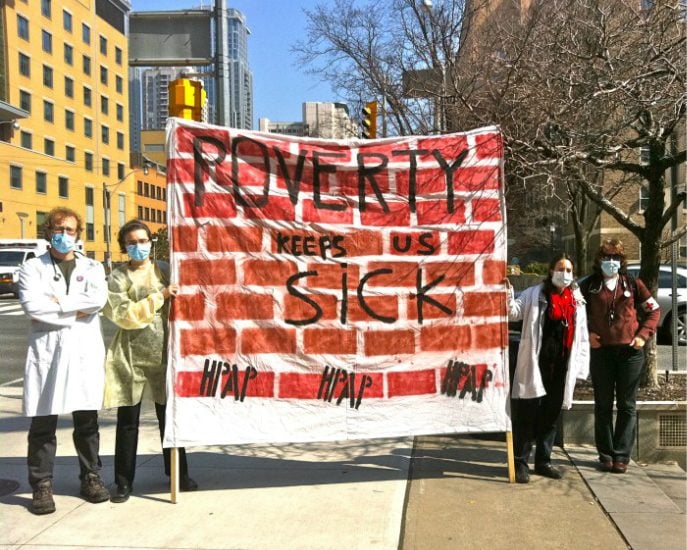KJIPUKTUK (Halifax) – Health care is always an important public policy issue in Nova Scotia, and indeed the rest of Canada, during election time or otherwise. We often hear about the rising costs of health care. Things like drugs, technology and equipment, utilization, doctors, nurses, labour agreements continue to drive up the cost.
In fact, health care in Nova Scotia currently consumes 46% of the provincial budget. And health care costs go up every year, faster than provincial revenue. It is said that this state of affairs will continue unless there are structural changes to the healthcare system.
Maybe there’s another way to address these issues. Maybe if we were to focus on the social determinants of health…

The social determinants of health are the living conditions people experience that have an impact on whether they stay healthy or become sick. According to the primer Social Determinants of Health: The Canadian Facts, these include income and income distribution, unemployment and job security, employment and working conditions, education, food security, housing, the social safety net, health services, and other factors.
Most of our elected officials rarely, if ever, talk about the social determinants of health. But people live the impact of them every day, and they are shaped by our governments’ public policy choices.Maybe it’s time our elected officials addressed these issues when talking about their plans to improve health care. These issues are all intertwined.
Income and income distribution – the rich get richer, the poor get poorer
For the first part in the series, I’ll focus on what is easily the most important social determinant of health: income and income distribution.
A person’s income level impacts many facets of their life, including general living conditions, psychological functioning, diet and exercise, and also determines the quality of many other social determinants of health.
People with lower incomes are prone to more health problems, in no small part due to the fact that a lower income means they are less likely to be able to afford quality food, clothing and shelter. They also face higher levels of social exclusion, which can affect their long-term health and result in less-than-fulfilling lives.
What is concerning here is the rising level of wealth inequality in the province and the country. Over the last 35 years, particularly from 1991 to 2007, Nova Scotia’s GDP per capita grew by about 70%, yet the median wages after inflation for the average Nova Scotian dropped by 5%. And the lower a person’s income was, the more it dropped.
All the extra wealth Nova Scotia accumulated in those 35 years certainly didn’t go to the average working people. Nor did it go to the government in the form of tax revenue. Personal and especially corporate tax rates have shrunk precipitously over the last three to four decades.
This extra wealth went to those who are already quite rich. In fact, since 1991, the portion of wealth that went to average working people declined by 75%, yet the portion that went to employers, investors and other owners of capital increased by 140%. This is one of the key tenets of neoliberalism, the political ideology that has dominated most Western economies for many years.
So what can we do about this?
Thankfully, some of our elected officials are starting to realize and are acknowledging how important a livable income is to regular working people.
Nova Scotia’s minimum wage is currently $10.85 per hour, the third-lowest in Canada. NDP leader Gary Burrill is promising to raise the minimum wage to $15 per hour within three years if the NDP wins the upcoming election. This would impact 130,000 Nova Scotians, more than half of whom are women.
The NDP also promises to increase the tax rate by 3% for people earning more than $250,000 per year. They say this will bring in another $82 million in government revenue over four years.
As for the Liberals and the Progressive Conservatives, there has been very little, if any, discussion on income and income distribution.
These policies to address income and income distribution would certainly go a long way toward reducing inequalities in income and wealth, and would also provide many health benefits for disadvantaged Nova Scotians. However, much more needs to be done.
In particular, the minimum wage should be increased to a living wage. A recent report from the Canadian Center for Policy Alternatives says that two working parents with two children would need to earn at least $19.17 an hour in Halifax, and $17.30 an hour in Antigonish.
Other potential ways to reduce income and wealth inequality include: improved pay equity; higher assistance levels for those who cannot work; higher child benefits similar to levels in other countries; a guaranteed minimum income; and making it easier for workplaces to unionize.
So what can you do about this? You can learn more about the social determinants of health and start talking about them! And no better time to do so than during an election, with candidates knocking on your door.
This is the first in a series of articles that will look at the social determinants of health in Nova Scotia, their negative impacts on the health system, and what to do about it. Stay tuned.
Alex Kronstein is an Autistic adult and host of the podcast The NeurodiveCast. He is passionate about disability rights, social justice issues, and filmmaking. Follow Alex on Twitter.
If you can, please support the Nova Scotia Advocate so that it can continue to cover issues such as poverty, racism, exclusion, workers’ rights and the environment in Nova Scotia. A pay wall is not an option, since it would exclude many readers who don’t have any disposable income at all. We rely entirely on one-time donations and a group of 25 or so dedicated monthly sustainers.




I would vote for you Kendall.